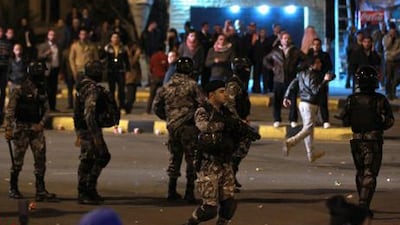Ammman // Protests erupted in Jordan's capital Amman and provincial towns after the government cut fuel subsidies in a move to secure a $2-billion (Dh7.35bn) IMF loan but which sent fuel prices soaring.
More than 1,000 people spilled into the streets in the capital Amman late on Tuesday and smaller protests erupted in several provincial towns after Islamist and tribal opposition groups said they would demonstrate.
Hundreds of protesters chanted against King Abdullah and the powerful intelligence forces.
Angry crowds of young men gathered in Amman's main Dakhiliyah square to denounce the widely expected price hikes. Authorities bolstered security across the country.
Unlike pro-democracy Arab Spring-inspired demonstrations in neighbouring countries that have turned violent, Jordan has not recorded a single death in nearly two years of peaceful protests.
Elsewhere in the country, scattered protests went off peacefully but a petrol station was burnt by angry youths in the country's second largest northern city of Irbid.
The move announced by the cabinet and which takes effect after midnight is the first major rise in petrol prices since street protests early last year pushed Jordanian authorities to expand social spending and freeze major fuel price hikes.
The price rises range from more than 50 per cent for bottled gas used for cooking, 33 per cent for diesel and kerosene for transport and heating and 14 percent on lower grade petrol.
The government, mindful of public fury that exploded into street clashes in the depressed south of the country after price hikes in 1989 and 1996, had been reluctant to raise fuel prices.
Prime Minister Abdullah Ensour warned the mainstream Islamist opposition, the Muslim Brotherhood, the country's largest political party, against exploiting the price rises to agitate. He also said that the price hikes were unavoidable.
"If the move was delayed we would have faced a catastrophe and insolvency," he said in an interview with state television.
Most of the tribal and Islamist opposition has demanded faster reforms but does not seek the toppling of King Abdullah.
He is seen as an arbiter among competing tribes and a unifying force in a population divided between native Jordanians and a majority of citizens of Palestinian origin.
The budget deficit is forecast to rise to $3.5bn this year, Mr Ensour added, without saying how much would be saved by cutting the subsidies. Jordan had been spending $2.3bn annually on subsidies, almost a quarter of its annual budget.
"The fiscal situation of the kingdom had been heavily impacted by the Arab Spring," Mr Ensour said.
The bombing of a pipeline bringing Egyptian gas has forced Jordan to switch to costlier fuels for power generation and Saudi Arabia declined this year to repeat its payment of a $1.4bn cash injection to stop the economy heading to the brink of collapse.
Jordan hopes the subsidy cuts will show its commitment to fiscal consolidation and win support from the International Monetary Fund, Western and Arab aid.
Economists have said Jordan's ability to maintain a costly subsidy system and a bloated state bureaucracy, whose salaries consume the bulk of state expenditure, was increasingly untenable in the absence of large foreign capital inflows or infusions of foreign aid.

